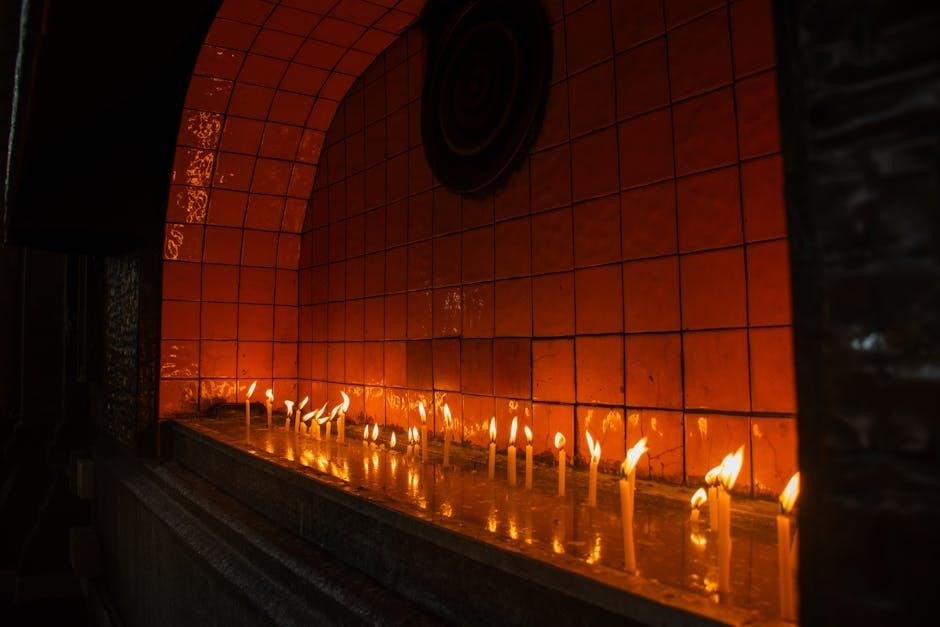Thomas Merton’s prayer reflects a deep surrender to God’s will, emphasizing trust and self-discovery. His famous “Prayer of Unknowing” highlights the journey of faith amidst uncertainty, featured in various PDF resources and writings like Contemplative Prayer.
1.1. Overview of Thomas Merton’s Spiritual Legacy
Thomas Merton, a Trappist monk and renowned spiritual writer, left an enduring legacy in Christian spirituality. His writings, such as Contemplative Prayer and Thoughts in Solitude, emphasize inner transformation, silence, and a deep connection with God. Merton’s work bridges Eastern and Western spiritual traditions, influencing modern prayer practices. His reflections on faith, humility, and surrender continue to inspire seekers of spiritual truth, making him a pivotal figure in contemporary spirituality.
1.2. Importance of Prayer in Merton’s Teachings
Prayer is central to Merton’s teachings, serving as a bridge between the soul and God. He viewed prayer as a means to surrender to divine will, fostering inner peace and transformation. Merton emphasized prayer as a dialogue of love, not ritual, urging seekers to embrace silence and stillness. His “Prayer of Unknowing” exemplifies this, highlighting trust in God’s plan amidst life’s uncertainties, making prayer a cornerstone of his spiritual philosophy.

The Concept of Contemplative Prayer
Contemplative prayer, as taught by Merton, is a deep, wordless communion with God, seeking unity beyond thoughts. It emphasizes inner stillness and surrender, leading to divine presence.
2.1. Definition and Significance of Contemplative Prayer
Contemplative prayer, as defined by Merton, is a silent, introspective practice aiming to unite the soul with God. It transcends words, focusing on presence and surrender. This prayer form is significant as it deepens spiritual awareness, fostering a profound connection with the divine and inner transformation, central to Merton’s teachings and writings, such as in Contemplative Prayer and Thoughts in Solitude.
2.2. Historical Context and Merton’s Contribution
Thomas Merton’s contemplative prayer emerged from a rich historical tapestry, drawing on Christian mysticism and Eastern spirituality. His work bridged ancient traditions with modern relevance, emphasizing inner stillness and divine presence. Merton’s synthesis of Hesychasm and Zen meditation, as seen in Contemplative Prayer, revitalized prayer practices, making them accessible and profound for contemporary seekers, thus deeply influencing Christian spirituality and interfaith dialogue.
Key Principles of Merton’s Prayer
Thomas Merton’s prayer emphasizes silence, stillness, and inner transformation. It seeks a deeper connection with God, fostering humility, wisdom, and self-awareness, guiding believers toward divine presence and peace.
3.1. The Role of Silence and Stillness
Thomas Merton’s prayer deeply emphasizes silence and stillness as essential for spiritual growth. These practices quiet the mind, allowing individuals to listen to God and foster a genuine prayer life. Merton believed that in stillness, one could encounter God’s presence, leading to a deeper connection and inner peace. His writings, such as Contemplative Prayer, highlight the importance of creating space for God through silent reflection and surrender.
3.2. Emphasis on Inner Transformation
Thomas Merton’s prayer teachings stress inner transformation as a cornerstone of spiritual growth. He believed prayer should lead to self-discovery and a deeper connection with God, stripping away illusions and fostering humility. Merton’s writings, such as Contemplative Prayer, highlight prayer as a catalyst for change, urging believers to surrender to God’s will and trust in His guidance, even amidst uncertainty and darkness.

Merton’s Famous Prayer: “The Prayer of Unknowing”
Thomas Merton’s “Prayer of Unknowing” expresses surrender to God’s will, emphasizing trust and faith in uncertainty. It reflects his belief in prayer as a journey of self-discovery and divine guidance.
4.1. Text and Meaning of the Prayer
Thomas Merton’s “Prayer of Unknowing” begins, “My Lord God, I have no idea where I am going.” It expresses surrender to God’s will, emphasizing trust and faith in uncertainty. The prayer reflects Merton’s belief in prayer as a dialogue with God, even in darkness, seeking divine guidance and self-discovery. Its themes of humility, trust, and spiritual surrender resonate deeply.
4.2. Its Relevance in Modern Spirituality
Thomas Merton’s “Prayer of Unknowing” remains highly relevant in modern spirituality, offering guidance amid life’s uncertainties. Its themes of trust, surrender, and inner transformation resonate with those seeking meaning in a chaotic world. The prayer’s emphasis on embracing the unknown aligns with contemporary spiritual quests for authenticity and peace, making it a timeless resource for personal reflection and growth.
Practical Applications of Merton’s Prayer Teachings
Merton’s prayer teachings encourage daily reflection, mindfulness, and surrender. His practices, like the “Prayer of Unknowing,” guide seekers to deepen their faith and find inner peace.
5.1. Daily Practices for Deepening Prayer Life
Merton’s teachings emphasize simple yet profound daily practices. Begin each day with a morning prayer, reflecting on surrender and trust. Incorporate the Daily Examen, a 15-20 minute reflection on God’s presence, and engage in Centering Prayer, focusing on a sacred symbol to consent to God’s presence. These practices foster mindfulness, inner peace, and a deeper connection to the divine, aligning with Merton’s philosophy of surrender and faith.
5.2. Incorporating Prayer into Everyday Life
Merton’s approach encourages prayer to permeate daily activities, transforming ordinary moments into sacred encounters. He advocates for mindfulness, finding God in simplicity, and embracing work as a form of prayer. By infusing prayer into everyday tasks and interactions, one cultivates a continuous dialogue with the divine, aligning with Merton’s belief that prayer is not just an act but a way of being present to God in all things.

The Influence of Eastern Mysticism on Merton’s Prayer
Merton’s prayer was enriched by Eastern mysticism, particularly Hesychasm and Zen, which emphasize stillness and inner clarity, aligning with his contemplative approach and universal spiritual themes.
6.1. Connections to Hesychasm and Zen Meditation
Thomas Merton’s prayer life was deeply influenced by Hesychasm and Zen Meditation, both emphasizing inner stillness and mindfulness. Hesychasm’s “Prayer of the Heart” resonated with Merton’s contemplative approach, while Zen’s focus on meditation aligned with his pursuit of inner transformation. These Eastern practices enriched his understanding of prayer, fostering a universal spiritual dialogue that transcended religious boundaries.
6.2. Universal Themes in Prayer Across Traditions
Thomas Merton’s prayer writings reveal universal themes shared across spiritual traditions, such as stillness, inner transformation, and self-surrender. His work bridges Christian mysticism with Eastern practices, emphasizing the unity of prayer as a quest for divine presence. These themes, reflected in his writings like Contemplative Prayer, highlight prayer’s timeless relevance and its ability to transcend cultural and religious boundaries, fostering a deeper understanding of the human spirit.
Merton’s Writings on Prayer
Thomas Merton’s writings on prayer, such as Contemplative Prayer and Thoughts in Solitude, offer profound insights into the nature of prayer, blending depth and simplicity, as seen in his PDF works.
7.1. Key Works: “Contemplative Prayer” and “Thoughts in Solitude”
Thomas Merton’s Contemplative Prayer explores the depth of prayer, urging seekers to cultivate a personal relationship with God. In Thoughts in Solitude, he reflects on prayer as a path to inner transformation, emphasizing simplicity and humility. Both works, available in PDF formats, remain essential resources for understanding Merton’s spiritual philosophy and its enduring relevance in modern spirituality.
7.2. Analysis of His Literary Style and Depth
Thomas Merton’s writings on prayer are marked by poetic depth and profound introspection. His literary style blends simplicity with richness, making complex spiritual truths accessible. Merton’s authenticity and vulnerability resonate deeply, inviting readers to embrace their own spiritual journeys. His works, such as Contemplative Prayer and Thoughts in Solitude, reveal a masterful balance of intellect and mysticism, offering timeless insights into the essence of prayer and inner transformation.

The Role of Prayer in Merton’s Monastic Life
Prayer was the cornerstone of Thomas Merton’s monastic life, shaping his daily rhythm, personal reflections, and communal worship, fostering inner transformation and service to others.
8.1. Prayer as a Foundation of Monastic Spirituality
Prayer was central to Merton’s monastic life, grounding his spirituality in daily rhythms of communal worship and personal devotion. His works emphasize prayer as a means to connect with God, fostering inner transformation and service. This practice was essential for nurturing a deep, abiding relationship with the divine, reflecting his belief in prayer as the heart of monastic living and a path to spiritual renewal.
8.2. Personal Reflections from His Monastery Experience
Merton’s monastery experience deeply shaped his prayer life, fostering a sense of solitude and contemplation. His writings reflect a profound connection to God, emphasizing the importance of surrendering the self. In his reflections, he often expressed the struggle to balance human frailty with divine grace, illustrating how prayer became his anchor in seeking God’s will and purpose amidst life’s uncertainties.
The Legacy of Thomas Merton’s Prayer Teachings
Thomas Merton’s teachings on prayer continue to inspire modern spirituality, offering timeless wisdom on surrender, grace, and inner transformation, influencing Christians globally in their spiritual journeys.
9.1. Impact on Modern Christian Spirituality
Thomas Merton’s teachings on prayer have profoundly influenced modern Christian spirituality, inspiring a renewal in contemplative practices. His emphasis on silence, stillness, and inner transformation resonates deeply, guiding seekers toward a more authentic relationship with God. Merton’s writings, such as Contemplative Prayer and Thoughts in Solitude, remain accessible in PDF formats, offering timeless wisdom for spiritual growth and fostering a deeper understanding of prayer’s role in daily life.
9.2. Continued Relevance in a Busy World
Thomas Merton’s prayer teachings remain remarkably relevant in today’s fast-paced world. His emphasis on silence, stillness, and inner transformation offers a counterbalance to modern life’s chaos. Merton’s wisdom, accessible in PDF resources like Contemplative Prayer, encourages seekers to find balance and inner peace. His “Prayer of Unknowing” reminds us to trust in God’s presence, even amidst uncertainty, providing timeless solace in a world overwhelmed by noise and distractions.
Thomas Merton’s prayer philosophy underscores surrender, trust, and inner peace. His timeless wisdom, accessible in PDF resources like “Contemplative Prayer,” continues to offer solace in a busy world.
10.1. Summary of Merton’s Prayer Philosophy
Thomas Merton’s prayer philosophy centers on surrender, trust, and inner transformation. He emphasizes contemplative prayer as a journey into the unknown, seeking God’s presence without clear outcomes. Merton’s “Prayer of Unknowing” reflects this, urging believers to embrace faith amid uncertainty. His teachings highlight prayer as a path to self-discovery and unity with God, resonating deeply in a world seeking spiritual grounding and authentic connection.
10.2. Final Reflections on the Timeless Value of Prayer
Thomas Merton’s teachings underscore prayer’s enduring relevance in seeking meaning and connection with God. His philosophy, as seen in works like Contemplative Prayer, emphasizes prayer as a path to self-discovery and divine union. In a chaotic world, Merton’s reflections remind us that prayer offers guidance, fostering inner peace and trust in God’s presence. His insights remain a powerful beacon for spiritual seekers, transcending time and circumstance.
